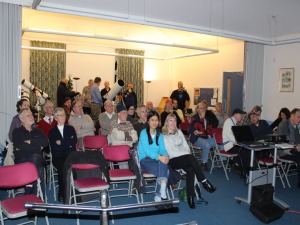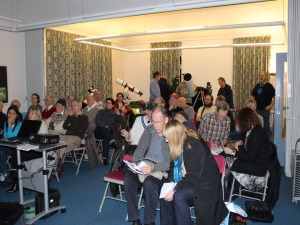We are back at our normal venue from 3rd Sept. 2021 |

This page lists our monthly meetings. For other events open to the general public, see our Events page
Dates are set well in advance but the 'content' of the meeting is only updated (from our 'meetings database') when details are entered, so 'blank' or 'TBA' may be shown when data has not yet been entered (please be assured that the meeting will take place and a talk on (some) Subject will be delivered by (some) Speaker ! )

During the COVID-19 restrictions, all meetings are being held on-line using ZOOM. Meetings are normally held at the Church Hall (aka 'The Soltau Center') of St James-the-Less, Stubbings, Maidenhead SL6 6QW, from 7.30 (for a ZOOM link, or map and directions, see the About MAS (Where we meet) page
The Main Topic is usually delivered by an invited guest speaker. We aim to provide a diverse range of subjects linked (in some way) to Astronomy - whilst the 'Second Session' is typically delivered by one of our members. If time allows, the evening concludes with a short 'What to see this month'.
Details of a typical evening (times are approximate) :- 7.30pm. The evening starts with the Chairman delivering any important Announcements and then introducing the main speaker. 7.45pm (latest). Main Topic Speaker gets up and the lights are turned off. If you arrive after 7.45, please enter the Hall by the first door (on the right, after the entrance) and please be extra careful when finding a seat at the back of the Hall as members often setup telescopes there ! 8.45-9pm +. Coffee break during which visitors often chat with members who have set-up their telescopes at the back of the hall. If the weather is good, sometimes members will nip out for a quick look at the sky. Smoking is permitted outside the Hall, however smokers are asked to avoid any 'observers' (smoke particles always seem to get into optical equipment, no matter how well 'sealed' it may be) 9.15pm (at the latest). The 'Second Session' then runs for about 45 mins, typically ending with "What's Up !" (what to look out for in the sky this month) 10pm. We aim to clear the hall by 10pm. Post meeting Observing. If the weather is good, the Observing Organiser then leads the way to our chosen observing site, or (if the weather looks even a slight bit 'iffy) members sneak off to the local Pub instead :-)
Next meeting :
(+) 7 Jun 2024 MAS 67th AGM - (Annual General Meeting)
Meetings Archive |
The meetings archive gives an 'overview' of the Society activities over the past 10 years (see also the Events page).
Members have access to the full 'History of MAS' (including AGM minutes going back to 1957) along with full names and photos
The MAS 'year' runs from September of one year to June of the following. The end of year AGM in June elects the Committee for the following year (there are no meetings in July and August - although often members will meet informally at the local pub - which gives the new Committee time to 'get a grip' on running the Society)
The "short cuts" (in the 'title bar', at the very top of this page) will take you to the June AGM entry for the end of that MAS year
The Maidenhead Astronomical Society meetings archive (last 10 years only)
Missed a meeting, or can't remember when a topic was last covered ? Here is the archive of past MAS meetings.
Note that this list covers only our monthly meetings and AGM's. Reports on Observing and Other Events are separate pages
If notes were taken at the meeting, the date below is underlined and shown with a '(+)' = click to see the notes (if no '(+)' is shown, no notes were taken - or, more likely, the webmaster hasn't found them and posted them up yet :-) )
(+) 3 May 2024 The Exploration of Venus - (Jim House)
(+) 5 Apr 2024 The Visible Universe - (Doctor Max Whitby)
(+) 1 Mar 2024 Water in the Universe - (Prof Jonathan Tennyson)
(+) 2 Feb 2024 The Mechanics of Eclipses - (Sheridan Williams FRAS)
(+) 5 Jan 2024 Telescope Parade - (and the Parker Solar Probe by Arthur White)
(+) 1 Dec 2023 SPECIAL FEATURE Herschels Lunatick Friends - (Andrew Lound)
(+) 3 Nov 2023 Binary Pulsars Einsteins Perfect Laboratories - (Barry Kellett)
(+) 6 Oct 2023 Solar Space Weather SOHO - (Dr Eric Dunford)
(+) 1 Sep 2023 The Changing Climate of Mars - (Peter Read)
(+) 2 Jun 2023 MAS 66th AGM - (Annual General Meeting)
(+) 5 May 2023 Two talks by members - (LATE CHANGE)
(+) 31 Mar 2023 Overview of telescopes and mounts - (Dave Hayes)
(+) 3 Mar 2023 Study of our Galaxy in the Era of Gaia - (James Binney)
(+) 3 Feb 2023 The Galaxy without a dark side - (Barry Kellett)
(+) 6 Jan 2023 Telescope Parade and Workshop - (by members)
(+) 2 Dec 2022 Xmas Social Photo Comp and Quiz - (set by members)
(+) 4 Nov 2022 Exploration of Jupiter - (Dr Mike Legett)
(+) 7 Oct 2022 The Lunar 100 - (Dr Lilian Hobbs)
(+) 2 Sep 2022 InfraRed Astronomy - (Dr Eric Dunford)
(+) 10 Jun 2022 MAS 65th AGM - (NOTE 2nd Friday)
(+) 6 May 2022 Gravitational Waves - (Joshua Pooley)
(+) 1 Apr 2022 Saturn - (Michael Foulkes)
(+) 4 Mar 2022 Update on the Exploration of Mars - (Jim House)
(+) 4 Feb 2022 What Astronomy Tells Us About The Origins of Life On Earth ? - (James Hough)
(+) 7 Jan 2022 Telescope Parade and Workshop - (by Members)
(+) 3 Dec 2021 Christmas Quiz set by members - (followed by Social Evening)
(+) 5 Nov 2021 CANCELLED - (Hall closed)
(+) 1 Oct 2021 Dark Nebulae - (Owen Brazell)
(+) 3 Sep 2021 How we reached the Moon - (Jerry Stone)
(+) 4 Jun 2021 63rd AGM (ZOOM on line meeting)
(+) 7 May 2021 Milestones in Astronomy - (Rod Hine (ZOOM on line meeting))
(+) 2 Apr 2021 The Red Sun - (Lyn Smith (ZOOM on line meeting))
(+) 5 Mar 2021 Tour of the Universe - (Jane Green (ZOOM on line meeting))
(+) 5 Feb 2021 Space Vehicles - (Graham Bryant (ZOOM on line meeting))
(+) 8 Jan 2021 The Astronomer's Toolkit - (Dr Lee Anne Willson (ZOOM on line meeting))
(+) 4 Dec 2020 Xmas Quiz - (set by members (ZOOM on line meeting))
(+) 6 Nov 2020 The Monster in the Crab - (Gary Poyner (ZOOM on line meeting))
(+) 2 Oct 2020 Is there anyone out there ? - (Bob Mizon (ZOOM on line meeting))
(+) 4 Sep 2020 Two eyes are better than one - (Stephen Tonkin (ZOOM on line meeting))
(+) 5 Jun 2020 COVID19 Postponed MAS 62nd AGM
(+) 1 May 2020 COVID19 Postponed The Monster in the Crab - (Gary Poyner)
(+) 3 Apr 2020 COVID19 meeting CANCELLED
(+) 6 Mar 2020 Recent Developments in Gravity Wave Research - (Martin Dyer)
(+) 7 Feb 2020 Ask an expert Q and A panel - (By Members)
(+) 3 Jan 2020 Equipment Parade - (By members)
(+) 6 Dec 2019 Xmas Quiz and social - (By members)
(-) 1 Nov 2019 The Origin of the Solar System - (James Fradgley)
Friday, 1st November 2019 - "The Origin of the Solar System" by James Fradgley
Notices Dave H has volunteered to take over from Tim as Meetings Secretary. Members who have something to present at meetings 'after the break' should contact Dave.
Main Speaker "The Origin of the Solar System" by James Fradgley<
James started by mentioning how the discovery of extra-solar planets and latest advances in computer modelling are leading to changes in our understanding of how the solar system formed and it's evolution into what we see today.
The Big Bang theory of the origins of the Universe shoe that the first matter was hydrogen with a little helium. Our solar system, however contains much that is not hydrogen. All of this must have been cooked up in the first generation stars. Our sum is at least a second generation star and most likely 3rd generation. It is formed from a gas cloud of material ejected from ancient nova and supernova.
Early models of how the gas cloud collapsed to form a sun with planets required an outside influence, thought to be a passing star. Since this would be a rare event, planets were also thought to the rare. However Kepler has shown that far from being rare, exoplanets are extremely common, with over 4,000 now discovered and 700 yet to be confirmed. Indeed, it is now believed that planets form with most suns.
The current theory, the Condensation Model, allows that the gas cloud collapsed naturally under it's own gravity.
Most of the gas ended ip on the sun, with the rocky material then aggregating together to form planets just outside the 'rock-metal line', the distance from the sun at which it is cool enough for rock and metal to condense. Outside the 'frost line', where it is cold enough for gas to condense, the gas giants formed. However multiple proto-planets formed and collided and reformed until only a few were left. It is believed that during this phase Mercury lost most of it's crust leaving a heavy core, the rotation of Venus was slowed, a collision with the proto-Earth formed the moon and Mars was so battered that it ended up the small planet we see today.
The gas giant Jupiter, was initially formed much closer to the sun. First it migrated closer, but then migrated outward under the influence of a 5th gas giant that was ejected from the solar system in the process. This migratioin may have been responsible for the early and late heavy bombardment of the inner planets. As Jupiter migrated outward, it is thought to have hoovered up a lot of the left over material leaving only the asteroid belt. At some point, Uranus and Neptune seem to have swapped position. This may have been under the influence of a 6th gas giant, aka Planet Nine in a long period orbit of 20,000 years or so.
Ed. After the collisions and migration of Jupiter, the planets settled into regular spaced orbits that are, it seems, stable. This had been noted by early observers, and in 1596, Johannes Kepler predicted the existence of a planet between Mars and Jupiter. We now know that Jupiter's gravity is too massive to allow a planet to form there, but the left over material was found, the Asteroid Belt. The harmonious orbits of the planets was another reason for thinking that solar systems would be rare, however we now know this is no accident. With planet migration now explained, every solar system will likely undergo similar planetary movements until their orbits are stable.
After the break
Tim displayed us a number of photos taken from his new home north of Oxford. They were most impressive and showed that his location has some good dark skies, even better he reports that his previous location.
David showed his photos f the Transit of Mercury. The next (and last in our life-time) is on the 11th of November, starting just after noon, ending after the sun sets.
If weather permits, Members may observe from Ockwells Park, althoygh no formal observing session is planned.
What's Up Aluns presentation can be downloaded as 2019-11-sky-outlook.pdf here
All our indoor Meetings are open to the public, however non-members are asked to make a contribution of £2 toward the hall hire costs (this may be collected by Fred, our Membership Secretary, at the door on arrival, or left at the 'Tea hatch' at half time).
This note last modified: 6th Nov 2019 10:41.